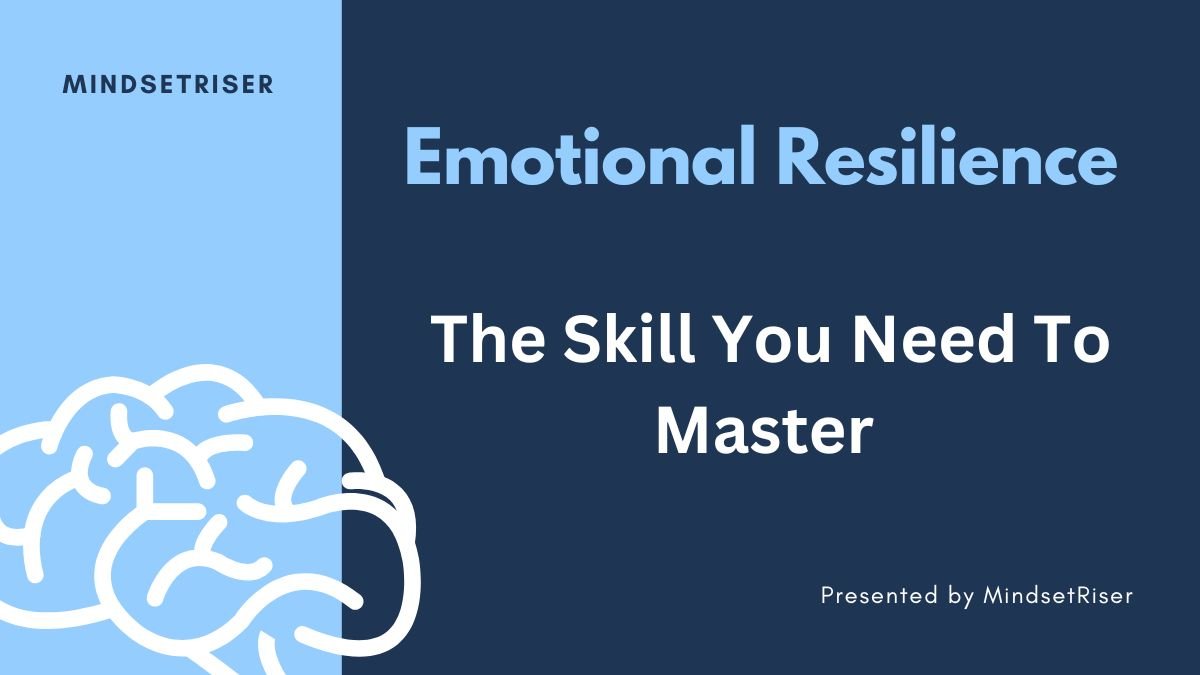Why Emotional Resilience is the Skill You Need to Master
Introduction
Life is full of challenges, setbacks, and uncertainties. Whether it’s a job loss, personal struggles, or everyday stress, how you respond determines your success and well-being.
The key? Emotional resilience—the ability to bounce back from difficulties, adapt to change, and stay mentally strong. In this article, we’ll explore why emotional resilience is essential, how it impacts different areas of life, and practical ways to develop it.
What is Emotional Resilience?
Emotional resilience is your ability to cope with stress, setbacks, and adversity without breaking down. It doesn’t mean ignoring emotions but rather managing them effectively.
People with high resilience:
✔ Stay calm under pressure
✔ Adapt to change quickly
✔ Handle criticism and failures better
✔ Maintain a positive outlook despite challenges
People with low resilience:
❌ Easily overwhelmed by stress
❌ Struggle to recover from failure
❌ Often feel hopeless or stuck
❌ Have difficulty managing emotions
But here’s the good news: Resilience isn’t fixed—it can be learned and strengthened!
Why Emotional Resilience is the Key to Success
1. It Helps You Overcome Setbacks Faster
Life is unpredictable. Challenges will come, but resilient people recover quickly instead of dwelling on failures.
🔹 Example: A business owner faces financial losses but adapts and innovates rather than giving up.
2. It Strengthens Your Mental Health
Resilience reduces stress, anxiety, and depression. When you develop coping strategies, you’re less likely to be overwhelmed by emotions.
🔹 Example: Instead of feeling defeated after a breakup, a resilient person focuses on self-improvement and healing.
3. It Improves Your Relationships
Strong emotional resilience helps in conflict resolution, communication, and empathy. When you manage your emotions well, relationships improve.
🔹 Example: Instead of reacting angrily in an argument, a resilient person stays calm and responds thoughtfully.
4. It Increases Your Productivity & Career Growth
Resilient individuals handle workplace stress better and are more likely to succeed in their careers.
🔹 Example: An employee receives negative feedback but uses it as motivation to improve, rather than taking it personally.
5. It Boosts Your Overall Happiness
When you learn to handle stress and setbacks positively, you develop a more optimistic and fulfilling life.
🔹 Example: Someone facing financial struggles focuses on long-term solutions instead of feeling hopeless.
How to Build Emotional Resilience
1. Shift Your Mindset to See Challenges as Opportunities
Instead of viewing challenges as roadblocks, see them as lessons for growth.
✅ Practice:
- Ask yourself, “What can I learn from this experience?”
- Focus on solutions, not just problems.
2. Develop Strong Self-Awareness
Understanding your emotions helps you manage them better.
✅ Practice:
- Reflect on how you react to stress.
- Keep a journal to track emotional patterns.
3. Strengthen Your Emotional Regulation Skills
Managing emotions is key to resilience. Instead of reacting impulsively, pause and respond thoughtfully.
✅ Practice:
- Use deep breathing or mindfulness to calm yourself.
- Count to 10 before responding in emotional situations.
4. Build a Support System
Resilient people have strong social connections that help them through tough times.
✅ Practice:
- Surround yourself with positive, supportive people.
- Seek help when needed—there’s no shame in talking to a friend or therapist.
5. Cultivate Optimism & Positive Thinking
Optimism isn’t ignoring reality—it’s believing that you can find solutions and move forward.
✅ Practice:
- Focus on what you can control, not what you can’t.
- Keep a gratitude journal—write down 3 things you’re grateful for daily.
6. Develop Healthy Coping Mechanisms
Unhealthy habits (like avoidance, overthinking, or addiction) weaken resilience.
✅ Practice:
- Engage in physical exercise, which boosts mental strength.
- Practice meditation, yoga, or deep breathing to reduce stress.
7. Learn to Let Go of Perfectionism
Striving for perfection increases stress. Instead, aim for progress, not perfection.
✅ Practice:
- Set realistic expectations for yourself.
- Celebrate small wins along the way.
8. Take Care of Your Physical Health
Your mind and body are connected—poor physical health can weaken emotional resilience.
✅ Practice:
- Sleep at least 7–9 hours per night.
- Maintain a balanced diet rich in brain-boosting foods.
- Stay hydrated and exercise regularly.
9. Reframe Negative Thoughts
Your thoughts shape your reality. Resilient people challenge negative self-talk and replace it with empowering beliefs.
✅ Practice:
- When thinking “I can’t do this,” reframe it as “This is difficult, but I can find a way.”
- Avoid catastrophizing—instead of assuming the worst, ask yourself, “What’s the best possible outcome?”
Conclusion
Emotional resilience is not just about surviving challenges—it’s about thriving despite them. By mastering resilience, you’ll handle stress better, improve relationships, and increase overall happiness.
Start by shifting your mindset, practicing self-awareness, and building healthy coping mechanisms. Over time, you’ll notice that setbacks no longer break you—instead, they make you stronger.
Key Takeaways
✅ Emotional resilience helps you overcome challenges, reduce stress, and succeed in life.
✅ Resilient people stay calm under pressure, adapt quickly, and maintain a positive mindset.
✅ Practical ways to build resilience include: reframing negative thoughts, strengthening social support, and practicing mindfulness.
✅ It’s a learnable skill—anyone can strengthen their resilience with practice!

